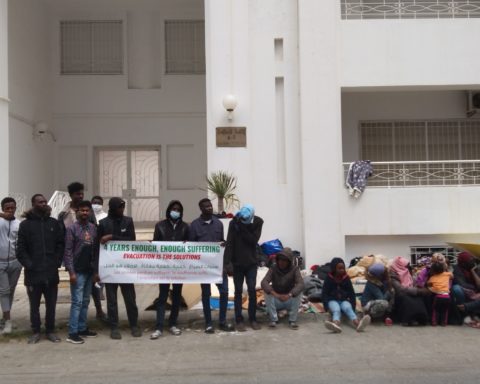by Fabrizio Urettini (Talking Hands)
A story, that of the amendment to the bill being passed in the United Kingdom and known as the Online Safety Act, which has alarming contours. A bill that was created for the protection of children online has extended the ban on the dissemination of child pornography and terrorism content to include images that somehow put migrant people in a “positive light.“
The new British Safety Bill 1 marks, in our view, a quantum leap in that intertwining of criminalizing logic and administrative efficiencyism in pursuit of what seems to have become the main goal of the migration policies of many Western countries, namely the exclusion of people on the move who are qualified as undesirable.
A process of criminalization that not only invests immigration policy and regulatory measures, but now also risks becoming a media process toward the establishment of a new criminal security law that, diverted from a prohibitionist and preventive connotation, devours all principles of the rule of law.
Let us review the reasons that led to the law text. Technology companies, including social media and search engines, have a duty to protect children from harmful content such as material that promotes self-harm and eating disorders, child pornography, revenge pornography, the sale of illegal drugs or weapons, and terrorism.
The bill introduces in this regard, a series of criminal offenses for England and Wales, the guarantor of which is the Ofcom (Office of Communications) – the competent authority and independent regulator for communications companies in the United Kingdom – which has a duty to report to companies messages or videos not in line with the new guidelines.
Violation of the new rules carries a fine, up to ten percent of turnover, and if the group fails to act promptly, those responsible risk imprisonment, with penalties of up to two years.
Under a further amendment to the bill, footage showing people crossing the English Channel 2 in small boats in a “positive light” will be added to the list of those illegal contents that all technology platforms will have to proactively prevent from disseminating.
Michelle Donelan, minister for digital at Downing Street, said posting videos in a positive light of crossings would result in aiding and abetting illegal immigration crimes.
The amendment seems to express a desire to censor “border crossing,” a practice, that of crossing borders and frontiers, that is widespread around the world, with a population now estimated at about 300 million people on the move.
Mass migrations that never more than in recent years have become part of our collective imagination: the rescues on the Sicilian channel practiced by NGOs and the Guardia di Finanza, the fishing boats and rubber dinghies loaded beyond all limits with human beings, the informal encampments along the Balkan route, the Aegean islands, the fences pierced in the forests of Hungary, the marches and long human convoys in Central America, the climbs to the Melilla barriers and the pickups in the Niger desert.
These images show us how much the old theories about migration no longer hold up, starting with the distinction between economic and political migrations-it would be more appropriate to speak of “forced migrations“-and how much the very idea of “foreigner” belongs to a political worldview that does not correspond to reality but is evidently still alive and capable of instilling fear.
Globalization has led to the free movement of goods, capital, economic and health policies, and means of communication, but it even prohibits showing, the movement of human beings or at least some of them.
We can therefore “ban” border crossing from our visual imagery, as well as images of the misery and desperation of migrant people trying to cross borders across the planet and Europe.
Instead, we cannot erase or attempt to disguise the contemporary mass exile, a population crossing the world’s borders today that is growing in number for endless reasons, not the least the ongoing climate crisis, and who live today within a spatiality that no longer recognizes natural and political barriers and borders, demanding the recognition of a new cultural and spatial dimension of the world.
Aware that the securitarian drift of the new Safety Bill, and word could not have been so inappropriate, involves a dangerous legal precedent on the part of a mature democracy like England whose legal system is cited as a model by several European and non-European countries, we decided to launch a “call for artists” asking friends and fellow designers, artists and photographers based in the UK and who, like us, identify with this new cultural and spatial dimension to send us a work to stimulate a debate and chorally demand that the amendment be withdrawn.
Campaign info: [email protected]

IG: @sebakurtis

IG: @pablondon2
- Online Safety Bill, UK Parlamient
- Who is breaking the asylum system? by Nando Sigona





